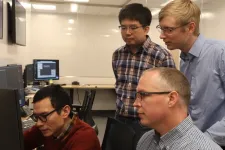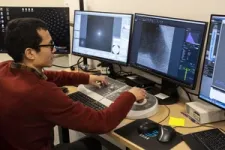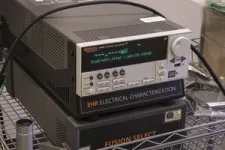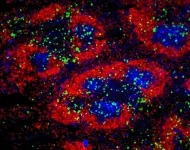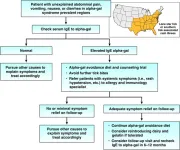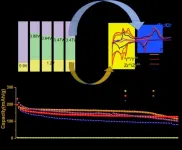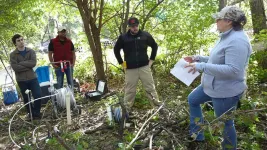(Press-News.org) COLUMBIA, Mo. — For more than 20 years, Matt Maschmann, an associate professor of mechanical and aerospace engineering at the University of Missouri, has worked with materials that require specialized technology — electron microscopes — to be seen by the human eye.
“When we deal with materials interacting on a nanoscale level, we can’t physically see the processes that are occurring, like the charging and discharging of a battery, for instance, without the help of an electron microscope,” Maschmann said.
Now, with the support of a two-year, $800,000 grant from the National Science Foundation and an additional $300,000 from the university, Maschmann and a team of researchers at MU are purchasing new equipment from Protochips which will allow researchers to conduct scientific experiments while simultaneously viewing reactions as they happen in real time — under the lens of a Thermo Fisher Scientific Spectra 300 Transmission Electron Microscope (TEM), housed in the Electron Microscopy Core (EMC) facility located in the Roy Blunt NextGen Precision Health building.
“The TEM is capable of letting researchers visualize reactions and material changes with up to atomic resolution, which is amazing,” Maschmann said. “But conducting experiments within a TEM environment is challenging because only small amounts of material will fit into a TEM chamber, and the system operates in a high-vacuum environment. Traditionally, researchers acquire TEM images of what a material looks like before and after an experiment, which leaves them to make an educated hypotheses about why and how a material has changed.”
With the new equipment, Maschmann said researchers will be able to gain a greater understanding of what’s going on at the most basic level of material’s structure by seeing an entire experiment unfold in real time. He said they can also use the new equipment to conduct experiments in three different environments — liquid, gas or vacuum — within the electron microscope. These new capabilities will allow them to explore and observe how different materials react to different environmental stimuli, like heat or electricity.
“For instance, we will be able to examine the composition of nanomaterials all the way down to the atomic level,” said Maschmann, who became interested in doing scientific research by working as an undergraduate student with Hongbin “Bill” Ma, who is now one of his colleagues at MU. “We can obtain detailed measurements by seeing the atoms moving and can even determine what element the atoms are.”
The new equipment also includes active image stabilization, which prevents images from moving, blurring or going out of focus while researchers follow a reaction.
“If we didn't have that [active image stabilization], it would be a big problem with these types of experiments,” Maschmann said. “For example, if we rapidly heat up a material, it's going to expand and move. So, if our original field of view is only a few hundred nanometers, as soon as heat is applied our area of interest will move beyond our original viewing area. Therefore, we would likely miss the reaction that we intended to observe.”
There’s still much to be explored at this level of material science, and Maschmann is excited for the opportunities that this new equipment can provide to help advance scientific research across MU and beyond. The EMC facility is available to support scientific research by faculty from any of the four UM System universities, and that includes the new equipment for the TEM, he said.
The grant also highlights an interdisciplinary collaboration between the EMC and the MU Materials Science & Engineering Institute (MUMSI). The goal of MUMSI, which opened in 2021 as a partnership between the MU College of Engineering and the MU College of Arts and Science, is to advance collaboration around materials research and engineering education across the university. Maschmann is also the co-director of MUMSI.
“MRI: Acquisition of Active Holders for in-situ and in-operando Transmission Electron Microscope Experiments,” was awarded by the National Science Foundation (2216026). Matthias J. Young, Xiaoqing He, Jaewon Lee and Maria Mills at MU are also involved with this project. The content is solely the responsibility of the authors and does not necessarily represent the official views of the funding agencies.
Editor's Note: Highlighting the promise of personalized health care and the impact of large-scale interdisciplinary collaboration, the NextGen Precision Health initiative is bringing together innovators from across the University of Missouri and the UM System’s three other research universities in pursuit of life-changing precision health advancements. It’s a collaborative effort to leverage the research strengths of Mizzou toward a better future for the health of Missourians and beyond. The Roy Blunt NextGen Precision Health building at MU anchors the overall initiative and expands collaboration between researchers, clinicians and industry partners in the state-of-the-art research facility.
END
A new view of microscopic processes
New equipment for a specialized electron microscope at the University of Missouri is added with the support of a $800,000 grant from the National Science Foundation
2023-03-21
ELSE PRESS RELEASES FROM THIS DATE:
Decline comes later than previously thought
2023-03-21
Utrecht, March 21, 2023 - Recent research from University Medical Center Utrecht (UMC Utrecht) shows that our brain declines later than previously thought. Instead of after our 25th year of life, it happens when we are between the ages of 30 and 40. The researchers published their results in Nature Neuroscience.
Clinical technologist Dorien van Blooijs and neurologist Frans Leijten, together with colleagues from UMC Utrecht and the Mayo Clinic, conducted research into the processing speed of our brain and how it changes as we age.
Faster ...
LSU Health New Orleans study suggests interprofessional team training could prove effective in AUD prevention & treatment
2023-03-21
New Orleans, LA – An LSU Health New Orleans study demonstrated the effectiveness of single, focused Interprofessional Education (IPE)-based exercises in preparing young health professions learners to limit or prevent alcohol use disorder (AUD). Students learned together as a foreshadowing of future interprofessional practice. This intervention produced significant decreases in the stigma associated with alcohol use, which is highly relevant for potential AUD patients. Results are published in BMC Medical Education, available here.
“These results may translate into more effective and collaborative ...
HonorHealth Research Institute is Arizona’s first to adopt new radiation protection technology in treatment of heart disease
2023-03-21
SCOTTSDALE, Ariz. — March 21, 2023 — HonorHealth Research Institute announced today that it is among the first healthcare providers in the U.S., and the first in Arizona, to use an advanced radiation protection system as part of the diagnosis and treatment of heart disease.
Modern cardiac catheterization laboratories use multiple X-ray beams from different angles to produce high-quality images of the heart, major arteries and other tissues. These low-level radiation beams enable physicians to guide catheters and other devices during interventional cardiology procedures, which are non-surgical, catheter-based therapies for ...
Insights into causes of rare genetic immune disorders
2023-03-21
The cellular glitches underlying a rare genetic disorder called activated PI3K Delta syndrome 2 (APDS2) have been identified by researchers at the Garvan Institute of Medical Research. The disorder is caused by genetic variations that disrupt immune cell signalling through a protein called PI3K.
“This study tells us how signalling in the immune system needs to be tightly balanced to make an effective response to infection. Sometimes it’s turned down and you have a problem, and sometimes signalling being turned up can interfere with an immune ...
Lone star tick bites may be to blame for unexplained digestive problems
2023-03-21
Bethesda, MD (March 21, 2023) — The American Gastroenterological Association (AGA) has released new clinical guidance to help physicians and patients identify if unexplained digestive symptoms are due to alpha-gal syndrome, a food allergy that is caused by lone star tick bites. The AGA Clinical Practice Update was published today in Gastroenterology.
Alpha-gal syndrome is an allergy that causes your body to react to eating meat from mammals and products made from mammals. Symptoms usually start 2-6 hours after eating the mammalian meat or food.
Clinicians should consider alpha-gal syndrome in patients ...
Forests reduce health risks, new global report confirms
2023-03-21
Forests, trees and green spaces play a vital role in ensuring a healthy life for all on a global scale.
The health benefits of forests and trees, ranging from physical and mental well-being to overall mortality reduction, far outweigh the adverse effects on health. As health threats, such as forest fires, are mainly caused by human activities, urgent action is needed.
In order to address health challenges, it is important to recognize the close links between human health and the health of other species, of ecosystems, and of the planet as a whole.
Vienna, March, 21, 2023 - The global scientific evidence of the multiple types of benefits ...
ASBMB cautions against drastic immigration fee increases
2023-03-21
The American Society for Biochemistry and Molecular Biology sent recommendations to the U.S. Citizenship and Immigration Services related to the agency’s proposed changes to petition processing fees. The USCIS proposed increasing its filing fees for employment-based visas by up to 2,050%, a measure intended to remedy financial deficits at USCIS and ramp up hiring to improve services. The ASBMB expressed concern about how “the proposed rule is likely to harm the retention of highly skilled foreign-born scientific researchers.”
The ...
A new sight for the electrochemical stability in halide electrolytes
2023-03-21
They published their work on February in Energy Material Advances.
"Constructing an efficient ionic/electronic framework is crucial for the development of high-performance solid-state batteries," said Dr. Chuang Yu, a professor at the State Key Laboratory of Advanced Electromagnetic Engineering and Technology at Huazhong University of Science and Technology. "Currently, the application of solid-state batteries with inorganic electrolytes is challenging because most solid electrolytes have an unsatisfactory low oxidation potential."
According to Dr. Yu, halide electrolytes have been found to be cathode-stable materials with relatively wide electrochemical ...
Study confirms nitrate can release uranium into groundwater
2023-03-21
Eight years ago, the data was sound but only suggestive, the evidence strong but circumstantial.
Now, the University of Nebraska–Lincoln’s Karrie Weber and colleagues have experimentally confirmed that nitrate, a compound common in fertilizers and animal waste, can help transport naturally occurring uranium from the underground to groundwater.
Their new research backs a 2015 Weber-led study showing that aquifers contaminated with high levels of nitrate — including the High Plains Aquifer residing beneath Nebraska — also contain uranium concentrations far exceeding a threshold set by the Environmental Protection Agency. Uranium concentrations above that EPA threshold ...
PNAS announces six 2022 Cozzarelli Prize recipients
2023-03-21
WASHINGTON, DC – The Editorial Board of the Proceedings of the National Academy of Sciences (PNAS) has selected six papers published by PNAS in 2022 to receive the Cozzarelli Prize, an award that recognizes outstanding contributions to the scientific disciplines represented by the National Academy of Sciences (NAS). Papers were chosen from more than 3,200 research articles that appeared in the journal last year and represent the six broadly defined classes under which the NAS is organized. Additionally, the Editorial ...
LAST 30 PRESS RELEASES:
Evidence behind intermittent fasting for weight loss fails to match hype
How AI tools like DeepSeek are transforming emotional and mental health care of Chinese youth
Study finds link between sugary drinks and anxiety in young people
Scientists show how to predict world’s deadly scorpion hotspots
ASU researchers to lead AAAS panel on water insecurity in the United States
ASU professor Anne Stone to present at AAAS Conference in Phoenix on ancient origins of modern disease
Proposals for exploring viruses and skin as the next experimental quantum frontiers share US$30,000 science award
ASU researchers showcase scalable tech solutions for older adults living alone with cognitive decline at AAAS 2026
Scientists identify smooth regional trends in fruit fly survival strategies
Antipathy toward snakes? Your parents likely talked you into that at an early age
Sylvester Cancer Tip Sheet for Feb. 2026
Online exposure to medical misinformation concentrated among older adults
Telehealth improves access to genetic services for adult survivors of childhood cancers
Outdated mortality benchmarks risk missing early signs of famine and delay recognizing mass starvation
Newly discovered bacterium converts carbon dioxide into chemicals using electricity
Flipping and reversing mini-proteins could improve disease treatment
Scientists reveal major hidden source of atmospheric nitrogen pollution in fragile lake basin
Biochar emerges as a powerful tool for soil carbon neutrality and climate mitigation
Tiny cell messengers show big promise for safer protein and gene delivery
AMS releases statement regarding the decision to rescind EPA’s 2009 Endangerment Finding
Parents’ alcohol and drug use influences their children’s consumption, research shows
Modular assembly of chiral nitrogen-bridged rings achieved by palladium-catalyzed diastereoselective and enantioselective cascade cyclization reactions
Promoting civic engagement
AMS Science Preview: Hurricane slowdown, school snow days
Deforestation in the Amazon raises the surface temperature by 3 °C during the dry season
Model more accurately maps the impact of frost on corn crops
How did humans develop sharp vision? Lab-grown retinas show likely answer
Sour grapes? Taste, experience of sour foods depends on individual consumer
At AAAS, professor Krystal Tsosie argues the future of science must be Indigenous-led
From the lab to the living room: Decoding Parkinson’s patients movements in the real world
[Press-News.org] A new view of microscopic processesNew equipment for a specialized electron microscope at the University of Missouri is added with the support of a $800,000 grant from the National Science Foundation
